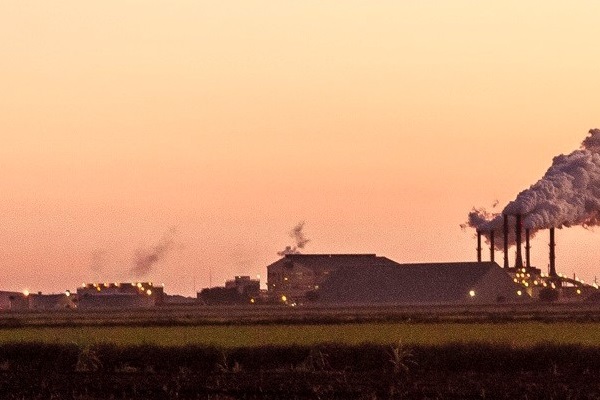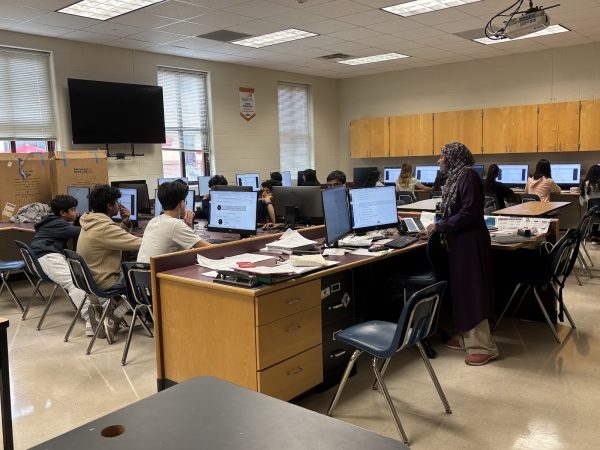Global warming: a solution through ethical eating

Used with permission from 1nelly from Flickr (https://www.flickr.com/photos/57739248@N02/15854799732/in/photolist-qa2ZA5-pR7VXN-7dZqV4-dqfnGf-efBtFo-5edEmH-Sj1VRe-kmuQ2B-5i2c1E-9V1viQ-eMMuN-hxuizd-5tLYcj-q8Dobs-efBts7-bnKaTf-efBu2y-847a1L-4icoQC-9wFUHy-aybtJN-ra79Hg-5SZebs-atnuSv-j5TPM6-4femqw-6RDitd-6as5bY-5u18Ud-5yUWio-4i6WJB-jgUYTK-dYtAmP-dX8M7i-5km6S3-qBDSBo-5ntXwt-aUWpLv-ekDv8Z-ixMT7S-dz2Jza-RJ436q-dz2YNa-Rpm5gP-5YEVYt-dz2Xer-4ibiZq-6m2ft3-SDkUFr-RmHz3U). Some rights reserved (https://creativecommons.org/licenses/by-nd/2.0/)
Besides the greenhouse gas emissions, factory farms also create serious pollution problems for the surrounding areas.
Think of the stereotypical American meal: a cheeseburger with fries, a hot dog at a baseball game, bacon and eggs in the morning, fried chicken if you’re living in the South. It’s not hard to spot the common factor tying all of these foods together- meat. It’s no secret that America runs on animal products; in fact, besides Luxembourg, America consumes more meat than any other nation- on average 270.7 pounds per person. Of course, all of the animals needed for this kind of mass-production can in no way benefit the environment so, why is it that so many Americans and people all across the world consume meat at the level we are? The answer: people live by tradition and tend to reject change. However, what happens when the traditions we are living by desperately need change in order to ensure the endurance of our planet?
According to a study done in 2011 by The Vegetarian Resource Group, five percent of American adults are strictly vegetarian. That leaves 95 percent of the American population eating meat- that is a lot of mouths to feed and of course, a lot of animals to both produce and kill. 10 billion animals are raised for the animal agriculture industry in the United States every year, and that’s excluding the marine life used for the seafood industry. Throughout the entire expanse of the world, 77 billion animals are raised each year for human consumption. The fact that’s commonly overlooked is that all of those animals need to eat too. Even disregarding the amount of land needed to grow all of the crops to feed these land animals, 12 kilograms of grain are required to produce a single kilogram of beef. The food grown for animal agriculture could feed the population facing malnutrition three times over. In other words, the food being fed to animals could easily end world hunger.
In addition to this, the waste produced by this mass of animal agriculture is incomparable. According to the US Department of Agriculture, the manure created by these animals is three times the raw waste of Americans. This generated manure is detrimental to water sources nearby, specifically the harmful levels of chemicals phosphorus and nitrogen; specifically, those high levels of nitrogen have the capacity to destroy aquatic life. And, according to the Environmental Protection Agency, three fourths of all water quality problems in the States stem from agricultural practices. Also, the electrical input needed to produce the levels of meat that is currently the norm are grand. According to a Japanese study, the energy needed to produce 2.2 pounds of beef is equivalent to the energy to light a 100-watt bulb for 20 days.
Probably the most relevant impact of “Confined Animal Feeding Operations” (basically factory farms) in regards to global warming is the methane and carbon dioxide emissions. Contrary to popular belief, while carbon dioxide is the most common greenhouse gas emitted, one ton of methane “has the warming effect of 25 and 72 tons of CO2” and, because of its shorter atmospheric lifespan, reducing methane would have a more immediately visible effect on the fight against global warming. With this information in mind, the fact that factory farming account for 37% of total methane emissions gas emissions and a shocking 65% of nitrogenous oxide emissions is alarming. These numbers coupled with the fact that 95% of the meat, dairy, and eggs in America originate from factory farms show the deadly effects that our agricultural habits are wreaking upon the environment.
The longer these habits continue, the worse our fate is going to be. From rising sea levels and an increase in forest fires, the effects of global warming are already being seen among daily life. According to the Union of Concerned Scientists ,“dangerously hot weather is already occurring more frequently than it did 60 years ago…This increase in heat waves creates serious health risks” such as respiratory illnesses and heat-related deaths. Along with risks to human health, the health of wildlife and plant life is also at risk. In the Rocky Mountains alone, “tens of millions of trees” have died within the span of the last 15 years due to deforestation and global warming. Spring has also been arriving earlier than ever before, bringing with it a more intense allergy season. Because of the increased temperatures, glaciers are melting at a rapid pace, augmenting to the rising sea levels. Scientists expect this trend to continue at an even more rapid pace. The increased world temperatures also increases temperatures within the ocean, causing many potential health problems for coral reefs. Coral reef damage is already a very real thing as the Great Barrier Reef is currently in great danger of extinction.
Specifically in the Southeast of the United States, the EPA states that temperatures are expected to rise four to eight degrees by the end of the century and there are going to be less and less days below freezing and more above 95 degrees. In addition, being by the east coast, we are threatened by rising sea levels- most notably the cities of Miami and New Orleans. As global warming continues to be an issue, clean water management will also become more of a challenge. Global warming, whether locally or on the global scale, is detrimental to the health of the planet, its ecosystems, and the its people.
The fact is, one of the easiest and most effective ways to help combat global warming and the future it will leave us with is to eliminate, or at least greatly reduce, meat consumption. Not everyone can buy solar panels for their house or bike the 45 minutes to work; what almost everyone can do is choose to have a salad rather than a hamburger at mealtime. The common fear conjoined with going vegetarian or vegan (besides missing the taste of meat) is the steep raise in grocery prices but, the price of meat has risen 10 percent since 2007 while the chief parts of a vegetarian or vegan diet- beans, rice, etc.- are still cheaper.
Along with this, questions of health risks and “getting enough protein” can be put to rest. In fact, eating too much red meat has been shown to have links to cancer and heart disease. Even the World Cancer Research Fund states that we should, “choose mostly plant foods, limit red meat and avoid processed meat”. Information from the Physicians Committee for Responsible Medicine supports these finding, saying that, “those who avoided meat were much less likely to develop the disease [cancer]”. Furthermore, the meat that is currently being consumed isn’t pure and healthy meat; to keep the overcrowded and restricted animals inside factory farms “healthy” and alive and to promote more growth (in order to reap more meat per animal), the animals are pumped full of antibiotics. Many of the animals are diseased and dying yet they still end up on our plates. In the end, a person’s personal health will not be compromised by his or her efforts to help the environment.
In order to help the planet against global warming, stopping animal agriculture- at least the system of how we are currently producing animals- is integral to the fight. With the big picture of saving the planet in mind ( and the knowledge that health and wallets don’t always have to be compromised), the real question we all need to ask ourselves is, is the taste of meat a big enough reason to continue the systematic destruction of our planet?
Your donation will help support The Lambert Post, Lambert High Schools student-run newspaper! Your contribution will allow us to purchase equipment and cover website hosting costs.











